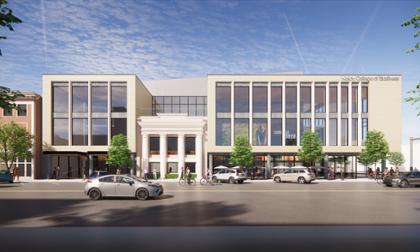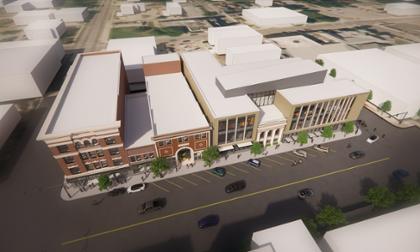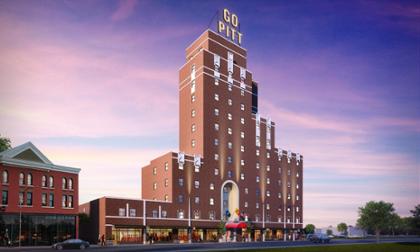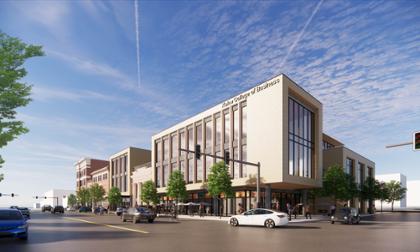Note: After this story was published in February 2023, changes were made to the plan that moved the location of the new Kelce College of Business two blocks south to the 200 Block of North Broadway. We are preserving this story in its original format for the historical record.
Current information can be found here:
Work to begin soon on downtown College of Business, Besse Hotel
Gorilla Rising project reaches new milestones
The evolution of the historic Besse Hotel
The university is cooperating with local business leaders and the City of Pittsburg on the initiative.
A new building for the Kelce College of Business will become the keystone anchor of this district, built at Fifth and Broadway on the footprint of the building currently leased by BMO Harris Bank.
In addition, the university will partner with the Colonial Fox Theatre to share space in a two-story pavilion already planned by the theater to accommodate a lobby expansion and theatrical support, to be built on the empty lot owned by the Fox between the two buildings.

The redevelopment of the historic Besse Hotel — the tallest building in Southeast Kansas and one of the most iconic structures in Pittsburg— also is a component.
The concept has been approved by the Kansas Board of Regents and endorsed by faculty and KCOB Dean Paul Grimes, who said the move will open a new era for business education in the region.
The estimated cost for the project is approximately $50 million, of which the Pittsburg State University Foundation already has $7 million in hand contributed by donors for the Kelce College of Business portion, which is estimated to cost approximately $34 million. The Besse Hotel portion is estimated to cost approximately $16 million.
On Feb. 7, the project took a giant step forward when the university learned it had been awarded a grant of $12.5 million from the Kansas Department of Commerce through its competitive University Challenge Grant program. Private-public partnerships will be sought to shore up the gap.
The next step will be to update donors regarding the project’s progress and to identify additional supporters to fund the remaining project costs.
Design development is projected to begin this spring, with the construction phase targeted to start in 2024 and classes beginning there in 2026.
"By moving downtown, we are embracing our micropolitan mission, which will provide us with new opportunities to engage with the Pittsburg business community on a more intimate level,” said KCOB Dean Paul Grimes. “It will provide us with creative new avenues for expanding our programs and curricular initiatives, including internship options with local businesses and living-learning communities in the expanded student housing options within the district.”
The area is just north of Block22, an innovative mixed-use development at Fourth and Broadway that opened in 2018 and is comprised of co-working space, restaurants, a coffee shop, a conference room, student apartments, and the Small Business Development Center.
In January, Block22 also became a satellite location of the Business & Economic Research Center under the direction of Pitt State Professor Michael Davidsson, who analyzes regional data each quarter and generates reports valuable to city planners and those in economic development.
When the new building is finished, the Business and Economic Research Center and the Professional Sales Center will move to it.

The current home to the KCOB, built in 1950 as a laboratory high school and converted for the college’s use in the mid-1970s, is today one of the most heavily utilized buildings on campus; more than 1,000 students are enrolled in business courses each year.
In 2015, a campaign was started to raise funds to provide students with an academic home that inspires innovation and nurtures entrepreneurial talents, which is now reimagined in the downtown project.
The university is exploring the future of the existing building. Lower-level business classes will remain on the main Pitt State campus. Once admitted to the Kelce College of Business at the end of their sophomore year, business students will take their specialized major courses downtown.
In addition, all graduate programs and faculty offices will be housed in the new downtown building, which will feature state-of-the-art classrooms, collaboration spaces, and space for professional development and public events.
Along with the move, the KCOB plans to offer new programs that are critical to growing Pittsburg’s business community. These include specializations in supply chain management and entrepreneurship, both of which will benefit from the proximity of Block22, Grimes said.
Davidsson also has begun teaching at Block22 this semester with the introduction of a senior capstone economics class.

The university has included developing the historic Besse Hotel as an addition to downtown student housing.
According to Pitt State Chief Strategy Officer Shawn Naccarato, who lead the Block22 development, this will add approximately 60 to 70 additional student housing beds to the existing Block22 mix. The first and second floors will feature public spaces.
Redevelopment of the Besse would be structured as a public-private partnership, similar to the model used in the creation of Block22, and would require identifying a private development partner.
“It’s the ideal location to develop a living-learning community, full of destination appeal for the students and a place from which they can fully immerse themselves within the district — moving between an intentionally designed network of classes, social and recreational spaces, faculty offices, internships, community activities, entrepreneurial resources, and study and living spaces,” Naccarato said.
Naccarato said the project is the result of months of collaboration by numerous players focused on solving challenges to the betterment of not just Pitt State, but the entire community and region.
“This is the next phase of us building off the success of Block22 — a true educational enterprise district that drives the development and prosperity of this community and beyond,” he said.
He credited the Department of Commerce for their partnership in the project.
President Dan Shipp expressed his gratitude to state leaders for continuing to invest in good ideas that will benefit both Pitt State, the city, and the region.
"This project is an innovative solution to growing the university and city together—a true win/win scenario for all involved! This project will allow Pitt State to continue creating a distinct advantage for its students, faculty, and staff, while at the same time advancing economic goals for the city and within the region."
Shipp also thanked donors, local government, and community leaders for their support and encouragement in advancing this project.

Students may choose from eight undergraduate majors: Accounting, Business Economics, Business Studies, Computer Information Systems, Finance, International Business, Management, or Marketing.
At the graduate level, students may choose from a traditional MBA program, an online MBA program, and the 4+1 Master of Professional Accountancy program. These students have the option to earn specializations in general administration, accounting, international business, human resources, and marketing.
All programs are fully accredited by the Association to Advance Collegiate Schools of Business – a prestigious status held by only the top five percent of business schools around the world.
Why build the Kelce College of Business Downtown?
We believe a downtown location and the applied learning experiences it will provide with local and regional businesses give Pitt State a unique educational advantage in recruiting new faculty and students within our four-state region.
Will students still take business courses on the main campus?
Yes. Most first- and second-year business courses (including general education courses for non-business majors) will be taught on the main campus. Faculty will also continue to have a presence on the main campus.
Didn’t you just renovate Kelce Hall on campus?
No. Over the past decade we have worked to engage our community, donors, and partners with a renovation of Kelce Hall, but that effort did not gain momentum, and Kelce Hall has remained largely untouched.
What will happen to Kelce Hall on the main campus?
This is being discussed, but most likely most of the building will be razed, leaving a small portion to accommodate some of our essential information infrastructure.
What about parking downtown?
Parking and transportation are key planning elements to the overall success of the downtown project. Our team is actively working with city leaders to study how best to accommodate various parking and transportation needs throughout the downtown area. This will be sorted out in the coming months.
How will students get back and forth from campus to downtown if they don’t have cars?
Students can already get back and forth using the Gus and PACT buses. That said, we know use of these buses will increase. Our team is actively working with city leaders to best accommodate transportation needs, and this will be sorted out in the coming months.
Do the images in the initial announcement represent the final design?
No. The announcement included conceptual renderings. We (and our architects) will be mindful of the downtown environment as the project fully develops.